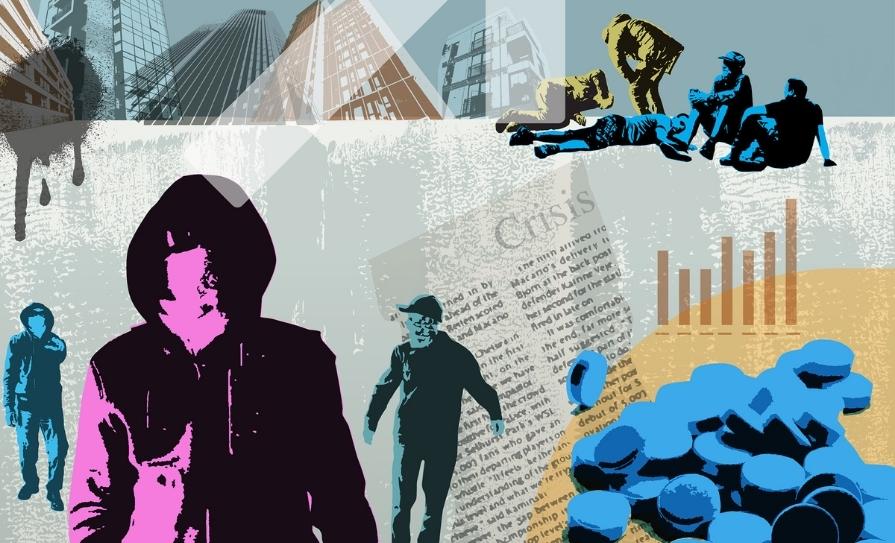Fintan Moore puts hid reporter’s cap on and examines what attributes to become a successful career shoplifter
People often worry nowadays that with the increased use of mobile phones and other technology by children and teens, families will fail to pass on traditions from one generation to the next. Based on my experiences in work with one extended local family, I can confirm that some traditions remain alive and well, more’s the pity.
Suffice it to say that the females of the clan that used to steal from me 15-to-20 years ago, before marrying-off and moving away, now have children of their own who were in to steal from me recently while back in the area for a funeral. The losses are an irritant, but the more galling thing is how nothing has evolved for these kids to have a better way to live. Let’s take a look now at the interview you will never hear.
In conversation with our reporter, two young shoplifters speak about the path they took to their chosen career. Amy Merrionvault-Delamere and Lucy Fotherington-Haughey. Amy: “I was near the top of my year in Mount Amityville, and got 625 points in my Leaving Cert, but none of the options in the CAO really jumped out at me. Then I heard about shoplifting as a career, and it sounded really interesting.”
Reporter: “What in particular did you like about it?” Amy: ‘It seemed like a great way to travel, and to experience different places, and shops of course. I’d done speech and drama, so I could act innocent and not attract suspicion. I’d captained the hockey team, so I found the quick footwork useful too! (laughing)”
Lucy: “I went to Amexandrandia College, but I wasn’t as academic as Amy. I used to shoplift a little as a hobby, then somebody admired my work and I realised I had a gift for it.” Reporter: “So that gave you the encouragement you needed?” Lucy: “Ohmigod, yes — I just didn’t have the self-belief until then, but it’s amazing what the right motivation can do when you’re starting out.”
Despite the outward appearance of privilege, both of these young women have known setbacks in their lives when they felt stigmatised. Amy: “There was one January when we were going back to school after Christmas hols, and daddy hadn’t got his annual bonus in December because his bank had laid off hundreds of people. So he didn’t have the money in his account to buy the new Range Rovers that himself and mummy had ordered. Poor mummy started dropping me at the school gates instead of driving me into the car park.
Daddy got his bonus a few months later when all the fuss was over, but the Range Rovers had registration plates for the second half of the year, so everyone knew they’d been delayed. Most girls were okay about it, but some were so mean.’
Reporter: “Thanks for sharing that, Amy — I can see how that must have hurt you.” Lucy: “Ohmigod, that’s like, the year I was meant to go skiing with my family in Val D’Isere, and all the A-listers in my class were booked to go there at the same time. It was going to be so awesome, but there was no snow there that year and my brothers are such try-hard skiers, so we went to Austria or some other dump because the snow was better. I mean, I was wearing a €1,000 Helly Hansen ski-jacket that nobody could see because it was snowing! While everybody else was in Val D’Isere just partying because they couldn’t ski. It just wasn’t fair.”
Reporter: “And what do your families think of your choice of career?” Amy: “They found it a little strange at the start — I’m the first in my family to branch out into shoplifting. But they can see that I’m happy and enjoying it, so they’re fine about it now.” Lucy: “Well, my father is a personal injuries lawyer, so what I’m doing is a more honest way to make a living. He’s still coming to terms with that but we’re agreeing to disagree!”
Reporter: “Thanks for being so open about your lives. I’m sure you’ll inspire others to follow in your footsteps. That’s strange… has either of you seen my wallet?”
Storm’s-A-Coming
It’s a perennial question, or maybe a hardy annual, but the problem of what to do when the weather turns bad has always been with us. As climate change looks set to bring more extremes of wind, rain and temperatures, it looks like there will be tough calls to make more often. The yellow, orange, red weather warnings that Met Éireann issues can be helpful, but it’s impossible for the forecast to cover all eventualities for all areas.
The recent Storm Barra had a patchwork quilt of colours across the country, but even within counties, people had different experiences on the ground. As a general rule of thumb, it seems reasonable for staff to travel to work if there’s a yellow warning, and unreasonable for an employer to expect them to travel through a red warning.
Orange is the tricky one, because an orange at 8.30am when people are going to work could be a red a few hours later when they’re leaving. It’s also perfectly possible for an area with an orange warning to have localised episodes of ‘red’ weather. The prudent approach in an orange warning would seem to be that staff can travel if they feel safe, but if they don’t, they can take it as unpaid leave. This might not work everywhere, but seems fair to me.
The picture for employers is slightly simpler, or more difficult, depending on how you look at it! The buck stops
with you, and if you don’t want to travel, nobody is pressuring you out the door. Personally, I’ll get to work come hell or high water, and will work alone in the pharmacy if the staff can’t make it safely. The only time that came to
pass was during ‘The Beast From The East’, when snows made roads nigh on impassable, although Brennan’s kept the bread arriving! My handiest way to work was by mountain-bike, but that’s a slightly niche approach. If I can’t afford to retire at a reasonable age and I’m still working when I’m 70, then I might need a plan B.
Contributor Information
Fintan Moore graduated as a pharmacist in 1990 from TCD and currently runs a pharmacy in Clondalkin.
His email address is: greenparkpharmacy@gmail.com








